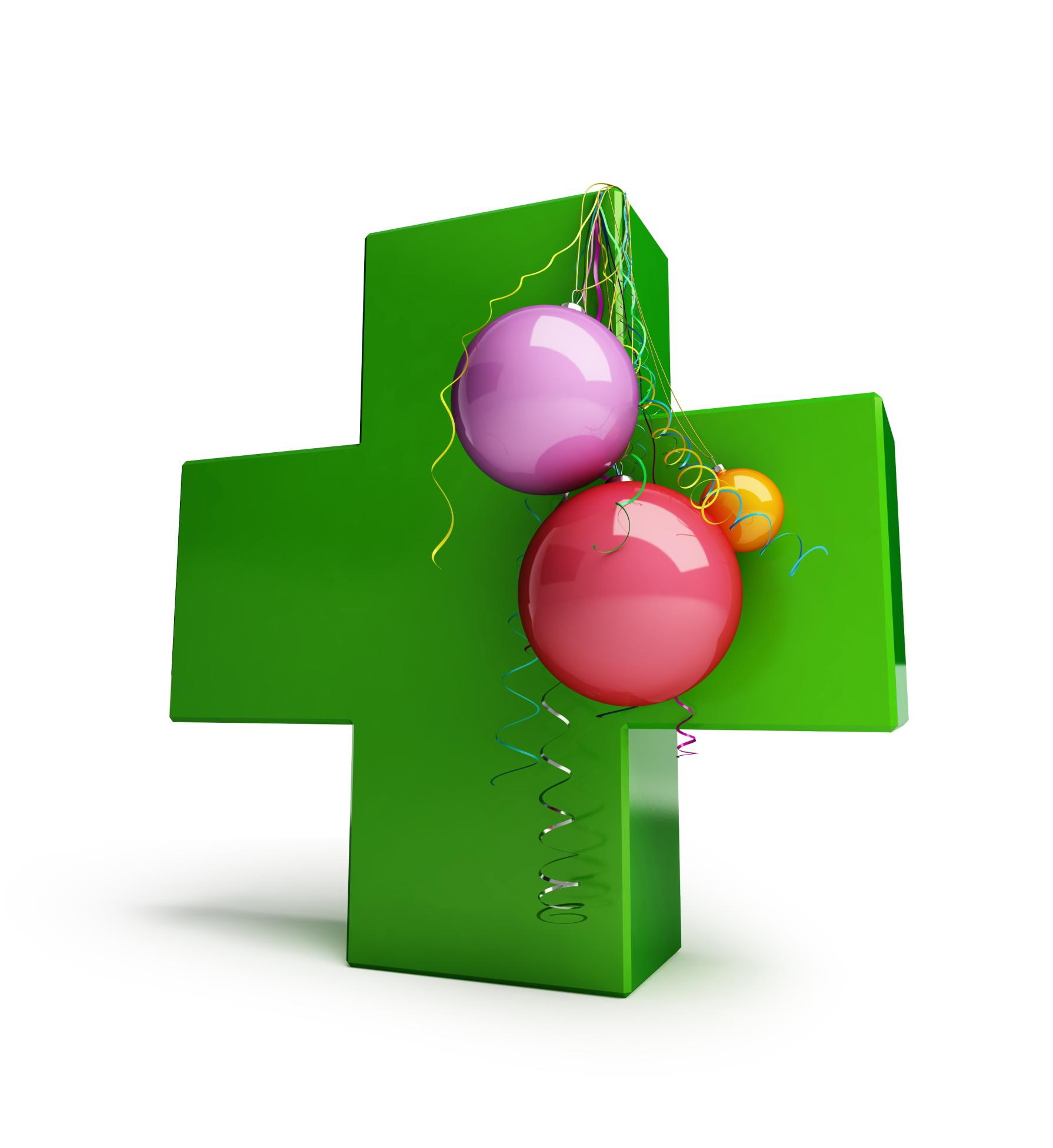Ten festive health hazards
More than 80,000 people are treated for Yuletide-induced injuries each year according to the NHS, not to mention the sore heads and indigestion that’ll be sweeping the nation. Avoid a trip to A&E by watching out for these 10 common Christmas threats
KITCHEN NIGHTMARES
With the Christmas meal usually involving several saucepans simultaneously bubbling away, a sweltering packed oven, and a marathon of chopping, slicing and carving, it’s no surprise the kitchen’s where most festive injuries happen.
Avoid a cooking catastrophe by making sure anyone not involved stays out of the way, and wipe spillages as soon as they happen.
Take your time and take care! When chopping, the hand holding the vegetable should be in a claw shape to protect your fingertips, and secure meat with a fork so it doesn’t slip as you’re carving.
If you suffer a minor burn, immediately hold it under cold running water for at least 10 minutes, then wrap in cling film to avoid infection. To stop bleeding from a cut finger, raise it above your head.
NOT SO GLORIOUS FOOD
Festive fun will quickly fester if the whole family comes down with food poisoning, which not only causes major discomfort but can be fatal. Nowadays, most people are aware of the importance of washing their hands after handling raw meat, especially poultry. However, it’s not necessary to wash the meat itself, as water that sprays off can spread bacteria. The key is to make sure the turkey or chicken is cooked through.
Follow instructions and always check it’s ready by piercing the bird where the thigh meets the breast – its thickest area. The juices that run out should be clear, not pink. Keep raw and cooked foods well apart, to avoid cross contamination.
OH CHRISTMAS TREE!
For many, Christmas isn’t complete without a real tree. But take care that any allergies or asthma in your loved ones are not exacerbated by mould spores carried by the trussed up conifer.
Moreover, around 1,000 people are injured annually by their tree. When decorating it, or reaching for presents underneath, watch out for branches – the needles can cause nasty eye injuries. When reaching to the top of a tall tree, stand on a sturdy chair or stepladder and ask somebody to hold it steady.
Take care also to stand the tree securely, and position it in an area where it’s least likely to be knocked or tripped over.
LIGHT UP SAFELY
Candles and fairy lights may look dazzling, but they can also be a fire hazard – especially with all that flammable tinsel and wrapping paper around. If you choose an artificial tree, make sure it’s fire-resistant, and ensure your tree’s kept a safe distance from the fireplace, electric heater or any open flames.
Fairy lights which are faulty or in bad condition can be a major cause of injury, including electrocution. Make sure yours comply with EU safety regulations, and when getting last year’s lights out, inspect them carefully before plugging them in, to ensure the wires are intact and haven’t frayed or been chewed by a mouse! Crucially, always remember to switch lights off and put out candles before going to bed.
BELLY ACHE AND BEYOND
Christmas Day largely revolves around food, and with so many treats on offer it’s easy to stuff yourself silly. Indeed, many of us consume up to triple the usual daily calorie intake on December 25.
While a slight tummy ache may seem a small price to pay, severe indigestion can be painful and alarming. In the long run, there’s the added inches to your waistline and all that extra fat and cholesterol to consider, too.
For a healthier lunch, rack up the green veg and reduce the number of roasties on each plate. Be wary of how much fatty butter and salt you’re adding to each dish and, instead of just crisps and chocolate, make sure there are healthy snacks on offer such as nuts and fruit. It’s also great to plan an activity that will burn calories, such as a walk, or even a game of charades.
BOOZE BOTHER
What with all the work parties and get-togethers with friends, it’s easy to drink more than usual over the festive season. Alcohol doesn’t just wreak havoc with our bodies, it can also make accidents more likely. Have fun but be cautious – on a big night out, alternate with water or soft drinks and arrange safe transport home in advance.
On Christmas Day, don’t get too tipsy if you’re cooking the dinner – hot stoves, knives and booze are a dangerous combination. Watch out also for injuries from flying corks when opening champagne.
SEASONAL STRESS
There’s a lot of pressure at Christmas – to be out having lots of fun, keeping difficult relatives happy, draining bank accounts to buy presents. No wonder it can become overwhelming.
Help yourself by focusing on what you do have, rather than what you don’t, or what you can’t afford. If getting through a family Christmas is a concern, plan an active itinerary, with walks and games, to reduce the potential for conflict. If possible, an activity alone, such as a relaxing bath, will do wonders.
Lessen money woes by agreeing on a budget per person for presents, as well as sharing the cost of food. Allocating tasks, so that the preparation and the epic post-dinner clean-up is shared will also help.
BLUE CHRISTMAS
Christmas can be an extremely lonely or isolating time for many people, especially the elderly who live alone. It can also be a time when the loss of a loved one feels even more poignant.
If you’re worried about somebody being lonely, think of ways you could help – if inviting them round for dinner isn’t quite an option, perhaps a drink and a walk? Exercise, and fresh air, is fantastic for boosting spirits.
If you are lonely, try to do as many activities as possible; get out if you can, speak to friends, even read a book or watch a movie. You might also consider volunteering at a charity, which will increase your interaction with others and help others.
KIDS AND ANIMALS
Dangling baubles, flashing fairy lights, glittering tinsel… Just a few of the many things that can be extremely enticing to little paws and hands at Christmas – and dangerous, too. Many tree ornaments are fragile and can easily smash. Also, pets and toddlers are both fond of shoving hazardous objects into their mouths, which can result in intestinal damage for cats and dogs and choking for tots. Be careful of small parts in presents and toys, too, and NEVER leave candles or bubbling pans unattended when there are children and pets around – serious accidents can happen in the blink of an eye.
THE GREAT OUTDOORS
Getting outside is great for body and mind – but nothing will curb the festive fun quicker than a trip to A&E.
Even if it hasn’t snowed, the ground may be covered by frost and slippery ice that can lead to twisted ankles or broken bones. Check weather reports before your Christmas walk and dress appropriately – sensible, grippy shoes and wrap up warm. Tread carefully and keep an eye on the ground.
For safe sledging, choose hills that end in a large, open space – nowhere that will send you careering into a street or fence.
Frozen ponds and rivers may look pretty, but the ice is probably thinner than you think and falling in may result in deadly hyperthermia – best admired from the banks instead.
Have you had a calamity at Christmas?
Latest posts by Sally - Silversurfer's Editor (see all)
- Should smacking a child be banned in England and Northern Ireland? - April 17, 2024
- Enjoy the best of the UK on a Shearings coach holiday - April 17, 2024
- Blueberry & Lemon Curd Bread and Butter Pudding - April 16, 2024
- Navigating the World with What3Words: A Lifeline for Older Generations - April 15, 2024
- Parsley Box – Bringing you time for the things you love! - April 12, 2024





















